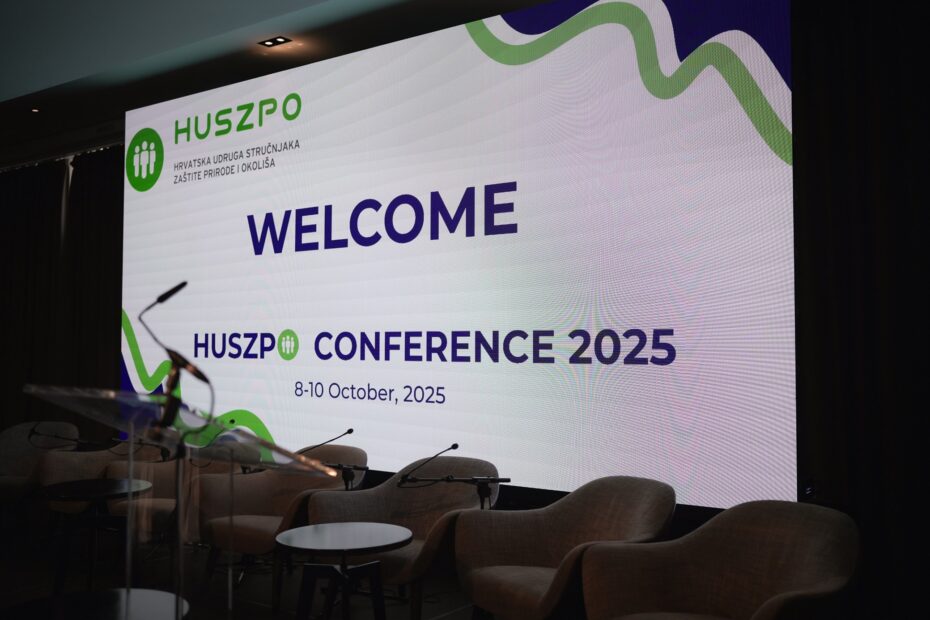Organized by the Croatian Association of Nature and Environmental Protection Experts (HUSZPO),the 6th Conference “Impact Assessment and the EU Taxonomy: From Policy to Practice” was held in Opatija on 9–10 October 2025. The conference brought together representatives from public institutions, the business sector, academia, and international organizations, and was organized in cooperation with the European Investment Bank (EIB), the World Bank, the European Commission (EC), the United Nations Development Programme (UNDP), and the International Association for Impact Assessment (IAIA), under the institutional patronage of the Ministry of Environmental Protection and Green Transition of the Republic of Croatia (MZOZT).
The conference addressed key issues related to the implementation of European sustainability regulations, the development of renewable energy sources, nature restoration, and the growing importance of social aspects in environmental impact assessment. The discussions emphasized the need for an integrated approach to sustainable development—linking regulatory frameworks, financial instruments, strategic planning, and public participation.
In the context of European legislation, participants analyzed the implications of the Omnibus I package and its impact on sustainable finance. It was concluded that simplifying regulations can help reduce administrative burdens but may also risk lowering transparency and the quality of data necessary to support the green transition. Representatives of the European Investment Bank and ESG experts stressed the importance of reliable information and clear objectives to maintain market stability and investor confidence. Most participants agreed that balanced approaches are needed—streamlining requirements while preserving ambitious sustainability goals.
Significant attention was devoted to the issue of cumulative impacts of renewable energy projects,where experts highlighted the need for a more systematic and strategic approach to impact assessment. High-quality cumulative assessments require professional capacity, robust analytical tools, and clear national strategic documents. The problem of “blocked” spatial plans was pointed out, as these often prevent the realization of new, more environmentally friendly projects. Participants agreed that spatial plans must be reviewed and aligned with realistic development capacities and that social effects must be equally integrated into assessments. Early involvement of local communities in development processes was identified as crucial for improving understanding, acceptance, and the long-term sustainability of projects.
The discussion on the Nature Restoration Regulation underscored its importance as a historic milestone in European environmental policy. For the first time, the Regulation introduces legally binding targets for ecosystem restoration, explicitly linking nature protection with development, climate, and economic policies. In Croatia, almost half of all habitat types are in an unfavorable conservation status, necessitating the urgent preparation of a National Nature Restoration Plan. Participants emphasized that successful implementation requires broad partnerships among public institutions, the scientific community, the private sector, and local communities. The role of EU financial instruments was recognized as essential, with an emphasis on their efficiency and alignment with national priorities. Nature restoration was identified as an investment in societal resilience, biodiversity, the economy, and overall quality of life.
The social aspects of environmental impact assessment were an important part of the conference conclusions. The growing complexity of projects and diversity of stakeholder interests call for a deeper understanding of social impacts, which increasingly drives the application of Social Impact Assessments (SIA). These assessments are no longer seen merely as a regulatory obligation but as tools for building trust with local communities, managing risks, and planning sustainable investments. However, participants pointed out the lack of clear methodological guidance, inconsistent institutional responsibility, and limited data availability. It was recommended to strengthen the regulatory framework and align it with international standards such as the IFC Performance Standards, EBRD Performance Requirements, Equator Principles, and OECD Guidelines for Responsible Business Conduct.
In conclusion,the conference reaffirmed that sustainable development is no longer a separate policy field but a common framework for all public policies, investment decisions, and social processes. A successful transition toward a green, inclusive, and resilient economy requires connecting environmental, social, and economic dimensions through cooperation among institutions, the business sector, and citizens. The 6th HUSZPO Conference in Opatija once again confirmed that Croatia possesses the knowledge, experience, and partnerships necessary to shape a sustainable future within the European and global context.
Below you can watch a short video from the conference

